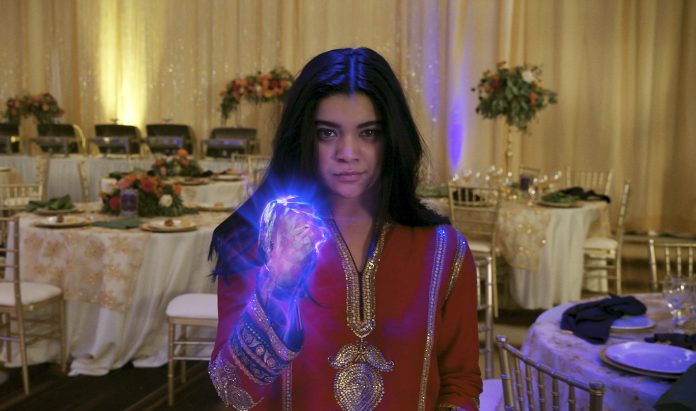Western film and television is commonly loaded with stereotypical and racist depictions of South Asians and Muslims. In hopes for inclusivity, filmmakers tend to show Indian and Pakistani Muslims as either oppressed or terrorists.
From hinting at Muslim characters carrying bombs to putting an obnoxious ‘yellow filter’ over scenes shot in India, the Western media is sending racist messages of South Asians and Muslims being dangerous or helpless.
This was not the case in “Ms. Marvel,” a charming and fun show about a Pakistani Muslim high school student.
While the Marvel show could have given more historical importance to the episodes of the Pakistan-India Partition, the first season of the series gives honest South Asian and Muslim representation.
The 2022 Marvel series created for Disney+ stars Iman Vellani as 16-year-old Kamala Khan living in New Jersey with her Pakistani born parents. Khan struggles to fit in at school but has close friends Bruno and Nakia to help her navigate her high school life.
Throughout the six episodes released in June 2022, directors Adil El Arbi and Bilall Fallah, Meera Menon and Sharmeen Obaid-Chinoy keep the story fixated on Ms. Marvel’s true culture and identity in America.
As Khan discovers the superpowers she inherited through a bangle owned by her grandmother, viewers travel back to Pakistan with Khan to explore her family history, and ultimately, the 1947 Partition of India and Pakistan.
The show runs a short story of two episodes depicting Khan’s great grandmother and her journey of finding love, starting a family then being torn away from them because of the violence and corruption in the country.
The episodes star Pakistani celebrities, Mehwish Hayat and Fawad Khan, playing Aisha and Hasan in pre-Partition India. When riots break out, they have a daughter, Sana, who grows to be Khan’s great grandmother. As Aisha and Hasan take Sana to catch the train leaving for Pakistan, Aisha gets lost in the crowd.
The historical significance is lost on the storyline as the show rushes past the painful memories of countless Pakistani families.
The series was not made to inform viewers about the Partition, rather to correct South Asian and Muslim representation in Western media.
Writer Bisha K. Ali wrote the show to reflect the cultural experiences of teenage South Asian girls and, apart from the superpowers and fighting villains, she hit the target.
The show does not fall in the common trope of a Muslim second-generation child who feels restricted in their house, and leaves. Rather, the scenes of Khan disagreeing with her Pakistani parents speaks honestly to the generational and cultural gap between immigrants and their children.
With Urdu songs, bright colours, traditional clothing and Pakistani wedding shopping and celebrations, every young South Asian girl can see herself in place of Ms. Marvel.
Khan also has close ties to her local mosque, where she attends for prayers, events and talks along with her friend Nakia. Nakia’s identity as an Arab Muslim shines through her hijab, as she takes pride in displaying the symbol of her religion. Nakia’s character is strong and opinionated and breaks the stereotypes of hijabi girls being ‘oppressed’ when she runs for a position on the mosque board.
The overwhelming sense of family and faith in the show brings warm energy to the screen with an entertaining Disney feel. Rather than getting fixated on the Partition or intertwining storylines, it can be appreciated that South Asian children, or inner children of adults, can see themselves reflected in this superhero.




